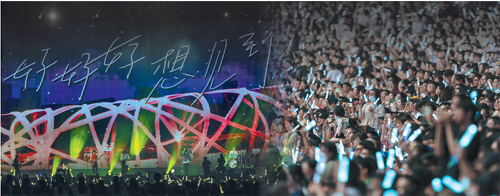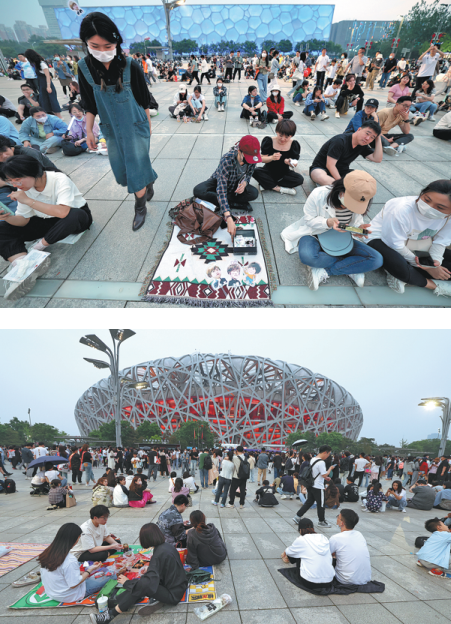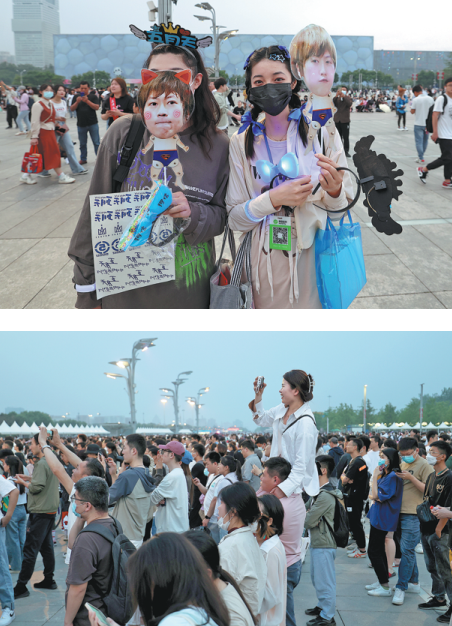LIVE SHOWS RETURN TO HUGE RESPONSE

Scalpers send ticket prices soaring, authorities move to regulate sales
Fans flocked to the National Stadium, also known as the Bird's Nest, on Friday for the first concert of Taiwan rock band Mayday's tour stop in Beijing.
They arrived at the stadium — the main venue for the Summer Olympics in 2008 — two hours ahead of the performance.
Those without seats found another way to celebrate the return of the band to the capital city — by singing along in the area outside the stadium.
Ashin, the band's lead vocalist, said during the concert: "I knew that there are many fans outside who couldn't enjoy the concert with us in the venue. When we performed here last time, we never expected we would have to wait more than 1,000 days to return and meet you again."
"Let's be quiet for a second to listen to their voices," he said referring to the supporters outside.
On May 9, fans flocked to buy tickets for the band's six concerts in Beijing, which sold out within seconds, with 40,000 bought for each performance.
Those who successfully purchased tickets shared their excitement on social media platforms.
One fan, nicknamed Beibei, who traveled with three friends from Chengdu, Sichuan province, to attend a Mayday concert for the fifth time said: "I have watched the band's performances since I was 18.I've had lots of fun and have beautiful memories of the concerts.
"It's like meeting an old friend, and it's hard to describe the excitement, especially after such a long time without watching their performances."
Beibei and her friends waited for an hour before the ticket sales opened.
"My heart was beating very hard and my palms were wet. The moment I bought the ticket, I screamed in delight. However, one of my friends didn't get a ticket," she said.
After Beijing, Mayday will hold concerts in other Chinese cities this year, including Wuhan, Hubei province, Quanzhou, Fujian province, and Chongqing.
In 1997, Mayday started out as a school band in Taiwan, and has since received four Best Band accolades at the Golden Melody Awards.
The group comprises five members — lead vocalist and songwriter Chen Shin-hung, better known as Ashin among his fans, guitarists Wen Shang-yi, or Monster, and Shi Chin-hang, or Stone, bassist Tsai Shen-yen, or Masa, and drummer Liu Yen-ming, nicknamed Guan You.
The band has won a large fan base with its original songs, including Stubborn, Suddenly I Miss You and Love-Ing, which are mostly themed around love, brotherhood and friendship. It continues to attract many fans who are considerably younger than the band members.
On April 29, 2012, Mayday staged its first concert at the National Stadium, which sold out within minutes.
Since then, the band has performed numerous concerts at the iconic venue. For most of the songs, fans stand up, frantically waving wands. However, for the past three years, like many other bands, Mayday had to postpone performances due to the COVID-19 pandemic.
That night in 2012, Ashin, who took off his shoes, asked the audience: "How long does it take you to get to the National Stadium? For some, it may be 20 minutes, while for others, it may be two hours. I know that many people have traveled from far away, but I want to tell you that it took Mayday 13 years to come here and perform."
First show
Mayday gave its first show in Beijing in 2004. Performing at a small live house venue, Wu Ming Gao Di, or Nameless High Place, the group shared the stage with local bands such as Joyside. About 30 people watched the show, paying 30 yuan each for a ticket.
On May 31, 2020, the band gave a live performance at an empty Taipei Municipal Stadium, where it held its first major concert in 1999, which attracted more than 10,000 fans. The one-hour live online concert attracted over 35 million views.
After the latest Beijing concerts were announced on May 5, Ashin posted on his Sina Weibo account, which has more than 23 million followers: "We will return to Beijing and meet you again. We can never sense this meeting without the meeting really happening. Luckily, it will happen soon."
On May 21, with the much-anticipated concerts just days away, the official social media platform of Beijing Olympic Park, which is home to the stadium, announced that a total audience of about 260,000 would attend the six Mayday concerts.
The announcement said: "Mayday's six concerts will be the first large-scale events held at the National Stadium after the country optimized its COVID-19 control measures. The Beijing Olympic Park management committee is committed to strengthening the security plan and is prepared to manage large crowds."
However, overwhelming demand jammed the Damai ticketing site, with countless infuriated fans unable to buy tickets. They lodged complaints on social media about the site failing to load, and said the platform did not allow them access to tickets, which allowed scalpers to cash in.
Members of Mayday's fan club were left disappointed, as the service for group tickets shut down suddenly. This resulted in fans trying to buy tickets from scalpers for high prices.
Scalpers asked 880 yuan ($125) for the cheapest tickets, priced at 355 yuan. The most expensive, costing 1,855 yuan, were offered for 2,780 yuan.
After failing to buy a ticket for the Beijing concerts, one fan posted on social media: "Only a small number of other bands in the country generate the same excitement as Mayday. People travel from different parts of the country to see the band because it's worth it. I will be very upset if I miss their concerts this year."
Hua Yue Fei Fan, a concert-organizing company based in Beijing, said in a statement: "As a co-organizer of Mayday's concerts for the past 16 years, we are honored to work with the band again. To protect the industry and combat ticket scalping, we decided to have three official sites to sell our available tickets."
While scalping is nothing new, it has witnessed a resurgence following the optimized COVID-19 control measures and the resumption of ticketed events. For example, on May 20, pop stars, including Zhang Jie, Mao Buyi and Jeff Chang, held concerts in different cities nationwide.
Furthermore, with the popularity of social media platforms, scalpers have more ways to acquire tickets for resale ahead of major concerts, such as selling them on e-commerce platforms or even on WeChat.
One scalper told The Beijing News that automated software is used by scalpers to buy tickets in large quantities. In this way, they obtain tickets for resale more quickly than individuals.
China Youth Daily reported that organizers of some events even view scalpers as secondary ticket agents by often reserving a proportion of tickets for scalpers. The report quoted a scalper as saying that organizers reserve tickets in some areas of venues, such as grandstand or front row seats, which the scalpers can buy and resell at higher prices.
Group's response
Fans' complaints on social media platforms drew the attention of local authorities in Beijing, who formed a work group to combat scalping.
The China Association of Performing Arts said the work group aims to respond to scalping by managing the origin of tickets and regulating sales based on a real-name system, as well as investigating scalpers online and at venues.
A statement from the association said: "If scalpers get their hands on tickets for popular concerts, prices could rise to an extreme level, and fans will not be able to afford them. By requiring real-name registration, we can prevent bots from automatically buying tickets, thus giving people who genuinely want to go to a concert a chance."
On May 15, some 20 scalpers were caught before concerts staged by pop stars Han Hong and Richie Jen in Beijing. The punishment for scalpers includes a fine of 500 yuan to 1,000 yuan and detention of five to 15 days.
However, some fans complaining about the real-name registration system for concerts said it is "essentially impossible and impractical".
On May 7, when organizers announced the ticket return rules for Taiwan pop singer Rene Liu's concerts in Shanghai six days later, many people rushed to sites to return tickets, as the rules stated they could only be returned from 9 am to 9 pm that day.
A similar situation occurred when organizers of Malaysian pop star Fish Leong's concerts in Shanghai on May 20 and 21 limited the return time for tickets to within 24 hours of them being bought. Fans could also return tickets 48 hours before the concert started, but this required 20 percent of the ticket price to be paid as a service charge.
A fan wishing to be named only as Kaka, who bought tickets for Liu's concerts in Shanghai, said: "I bought them for myself and my best friend, hoping to surprise her. However, the real-name system meant that I either return the tickets within 12 hours or had to ask my friend for her ID card to buy a new ticket.
"The idea behind real-name registration sounds good at first, but when you look at it further, there are too many difficulties that need to be sorted out. Many situations could lead to buyers failing to attend concerts. What if a buyer had an emergency and couldn't make it to the performance?
"Real-name verification is totally understandable as a way to combat ticket scalpers. Concert organizers require prospective buyers to register using their real names because of the overwhelming demand for tickets. However, the market response for every show varies."
Live performances are returning faster than expected. In February, the Ministry of Culture and Tourism announced the resumption of approvals for commercial performance applications involving people from Hong Kong, Macao and Taiwan, allowing more artists to hold concerts on the Chinese mainland.
Many artists, including Taiwan pop icon Jay Chou, Mayday and pop stars Li Yuchun and Xue Zhiqian, have announced their tour schedules.
Events professionals see the number of events and attendances reaching and potentially surpassing the pre-pandemic levels of 2019. Many people are eager to attend music festivals, concerts and other events they have been missing for the past three years.
Zhao Zhian, deputy director of Communication University of China's School of Music and Recording Arts, said: "Many concerts and outdoor music festivals have been announced since January, marking the return of the live music scene in China after the pandemic. It looks as though people are doing their best to make up for lost time."
Also head of the university's music industry research center, Zhao led his team's work on the annual music report released by the center during the 8th Music Industry Forum 2023 on May 19 in Beijing. The forum was co-organized by the university.
The report said the total size of China's music industry in 2021 exceeded 378 billion yuan, representing year-on-year growth of more than 8 percent and a return to the level reached in 2019.
Zhao said, "The performing arts sector related to music reached 11.8 billion yuan in 2021, a rise of 47 percent compared with 2020. The number will hit a record this year."
chennan@chinadaily.com.cn

























